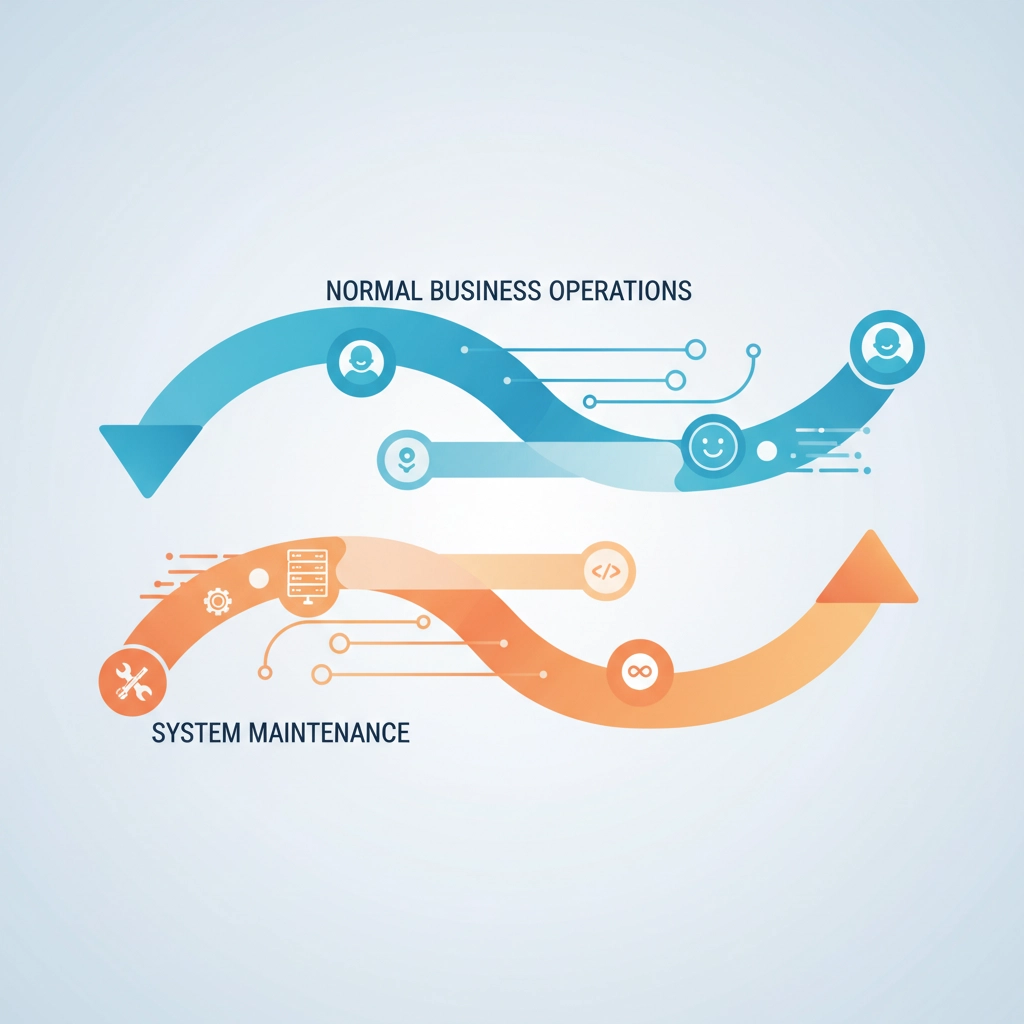The digital transformation of business operations has reached every corner of professional services across New York City. From plumbing contractors managing customer databases to accounting firms handling sensitive financial records, and construction companies coordinating complex project schedules, technology infrastructure has become the backbone of operational success. Yet for many small business owners in these traditional industries, navigating the complex landscape of managed IT services providers remains a daunting challenge—one that carries devastating consequences when approached incorrectly.
Selecting the wrong managed services provider can result in catastrophic system failures, security breaches that destroy client trust, and operational disruptions that permanently damage your competitive position. Conversely, partnering with the right provider transforms technology from a source of anxiety into a strategic advantage that drives growth, efficiency, and client satisfaction.
The stakes have never been higher. Every day of delay in securing proper IT management exposes your business to risks that multiply exponentially in our interconnected digital economy.
The Critical Questions That Separate Excellence From Mediocrity
1. What Is Your Guaranteed Response Time for Critical System Failures?
Time is the enemy during any technology crisis. When your scheduling system crashes during peak appointment booking hours, when your accounting software becomes inaccessible during tax season, or when your project management platform fails during a critical deadline, every minute of downtime translates directly into lost revenue and damaged client relationships.
Exceptional managed service providers operate with military precision when responding to emergencies. They maintain 24/7 monitoring capabilities, staff emergency response teams around the clock, and guarantee specific response times for different categories of issues. Demand concrete commitments: How quickly will they acknowledge your critical alert? What is their target resolution time for system outages? How do they escalate issues that require immediate intervention?
A provider that cannot offer definitive response time guarantees lacks the infrastructure and commitment necessary to protect your business operations. Their hesitation signals potential disaster for your organization.

2. What Industry-Specific Certifications and Expertise Does Your Team Maintain?
Technology competence cannot be assumed—it must be verified through rigorous certification processes and demonstrated expertise. Your managed service provider's technicians should hold current certifications from leading technology companies including Microsoft, Cisco, CompTIA, and specialized security organizations.
More importantly, inquire about their experience serving businesses in your specific industry. Plumbing contractors require expertise in mobile workforce management and customer relationship systems. Accounting firms need providers who understand compliance requirements for financial data protection and industry-specific software platforms. Construction companies demand expertise in project management integration and field communication systems.
Generic IT support fails when confronted with the nuanced requirements of specialized professional services. Demand proof of relevant experience, ask for client references within your industry, and verify that their team understands the unique technology challenges your business faces daily.
3. How Comprehensive Are Your Cybersecurity Measures and Monitoring Capabilities?
Cybersecurity threats target small businesses with increasing sophistication and frequency. Criminal organizations specifically target professional services firms because they maintain valuable client data while often lacking enterprise-level security measures. The consequences of a successful cyberattack extend far beyond financial losses—they include permanent damage to professional reputation, legal liability for client data breaches, and potential regulatory sanctions.
Your managed service provider must demonstrate comprehensive cybersecurity capabilities that include continuous network monitoring, advanced threat detection, email security systems, endpoint protection, and regular security assessments. They should provide detailed explanations of their security protocols, describe their incident response procedures, and demonstrate their capability to detect and neutralize threats before they compromise your systems.
Cybersecurity cannot be an afterthought or add-on service—it must be integrated into every aspect of their service delivery model. Providers who treat security as optional expose your business to catastrophic risks that could permanently destroy your professional practice.
4. Can Your Services Scale Seamlessly as Our Business Grows?
Small businesses in traditional industries often experience rapid growth phases that strain existing technology infrastructure. Your managed service provider must anticipate these growth patterns and provide scalable solutions that expand seamlessly with your business requirements.
Scalability encompasses multiple dimensions: Can they add new users quickly without service disruptions? Do their systems accommodate increased data storage and processing requirements? Can they integrate new locations or remote workers without compromising security or performance? How do they handle seasonal fluctuations in technology demands?
A provider focused only on your current requirements demonstrates short-sighted thinking that will force you to seek new solutions exactly when your business can least afford the disruption of changing providers. Demand evidence of their ability to support businesses as they grow from small operations to larger enterprises.

5. What Specific Services Are Included in Your Standard Support Packages?
Transparency in service delivery prevents costly surprises and ensures alignment between your expectations and their capabilities. Many managed service providers use attractive base pricing to win contracts, then charge additional fees for essential services that should be included in comprehensive IT management.
Request detailed documentation of all included services: What types of software and hardware support are covered? Do they provide user training and ongoing education? Are system updates and patches included? What about data backup and disaster recovery planning? How do they handle after-hours support requests?
Understanding the complete scope of included services allows you to make accurate cost comparisons and prevents budget overruns that could strain your business finances. Providers who cannot clearly articulate their service inclusions likely lack the organizational structure necessary to deliver consistent, reliable support.
6. How Do You Ensure Business Continuity During System Upgrades and Maintenance?
Technology maintenance and upgrades are inevitable requirements that can disrupt business operations if not managed properly. Your managed service provider must demonstrate sophisticated planning capabilities that minimize operational interruptions while ensuring your systems remain current and secure.
Inquire about their maintenance scheduling procedures: Do they coordinate with your business schedule to minimize disruptions? How do they test updates before implementing them in your production environment? What backup procedures ensure your operations continue during maintenance windows? How quickly can they restore normal operations if problems occur during upgrades?
Business continuity planning separates professional managed service providers from amateur operations. Your provider should treat your operational requirements with the same urgency and attention they would demand for their own business operations.
7. Can You Provide Recent References From Similar Businesses and Demonstrate Measurable Results?
Past performance provides the most reliable indicator of future service quality. Professional managed service providers maintain extensive portfolios of satisfied clients and can demonstrate concrete improvements in operational efficiency, system reliability, and cost management.
Request references from businesses similar to yours in size, industry, and technology requirements. Contact these references directly to inquire about their experience: Has the provider delivered on their commitments? How do they handle emergencies? What improvements have they achieved in system performance and reliability? Would they recommend this provider to other businesses?
Additionally, ask for specific metrics that demonstrate the provider's impact: How have they reduced system downtime? What cost savings have they achieved through improved efficiency? How have their security measures prevented potential threats? Measurable results provide objective evidence of their capability to deliver value to your organization.

The Decisive Factors That Determine Long-Term Success
Local Presence and Accessibility
While remote support capabilities are essential, certain situations require on-site intervention from qualified technicians. Your managed service provider should maintain local staff who can respond quickly to hardware failures, network infrastructure problems, and complex integration challenges that cannot be resolved remotely.
Geographic proximity also facilitates better communication and understanding of your local business environment. Providers who understand the unique characteristics of operating in New York City bring valuable insights that distant providers cannot match.
Proactive Management Philosophy
Exceptional managed service providers focus on preventing problems rather than simply responding to failures. They employ sophisticated monitoring systems that identify potential issues before they impact your operations, maintain detailed performance analytics that guide optimization efforts, and provide regular consultations to ensure your technology infrastructure supports your evolving business requirements.
Reactive providers wait for problems to occur, then scramble to provide solutions. Proactive providers anticipate challenges and implement preventive measures that maintain consistent operational performance.
Taking Action to Secure Your Technology Future
The managed service provider you select today will influence your business operations for years to come. This decision demands thorough evaluation, careful consideration, and prompt action to secure the partnership that will drive your continued success.
Delay in addressing your IT management needs exposes your business to escalating risks that compound daily. Every postponed decision increases your vulnerability to system failures, security breaches, and competitive disadvantages that could permanently impact your market position.
Contact MicroSky Managed Services today to begin the evaluation process that will transform your technology infrastructure from a source of concern into a strategic asset that powers your business growth.
Your professional success depends on reliable, secure, and efficiently managed technology systems. The right managed service provider partnership ensures that your IT infrastructure consistently supports your business objectives rather than constraining your potential.
Take decisive action now. Your future business success depends on the technology decisions you make today.



